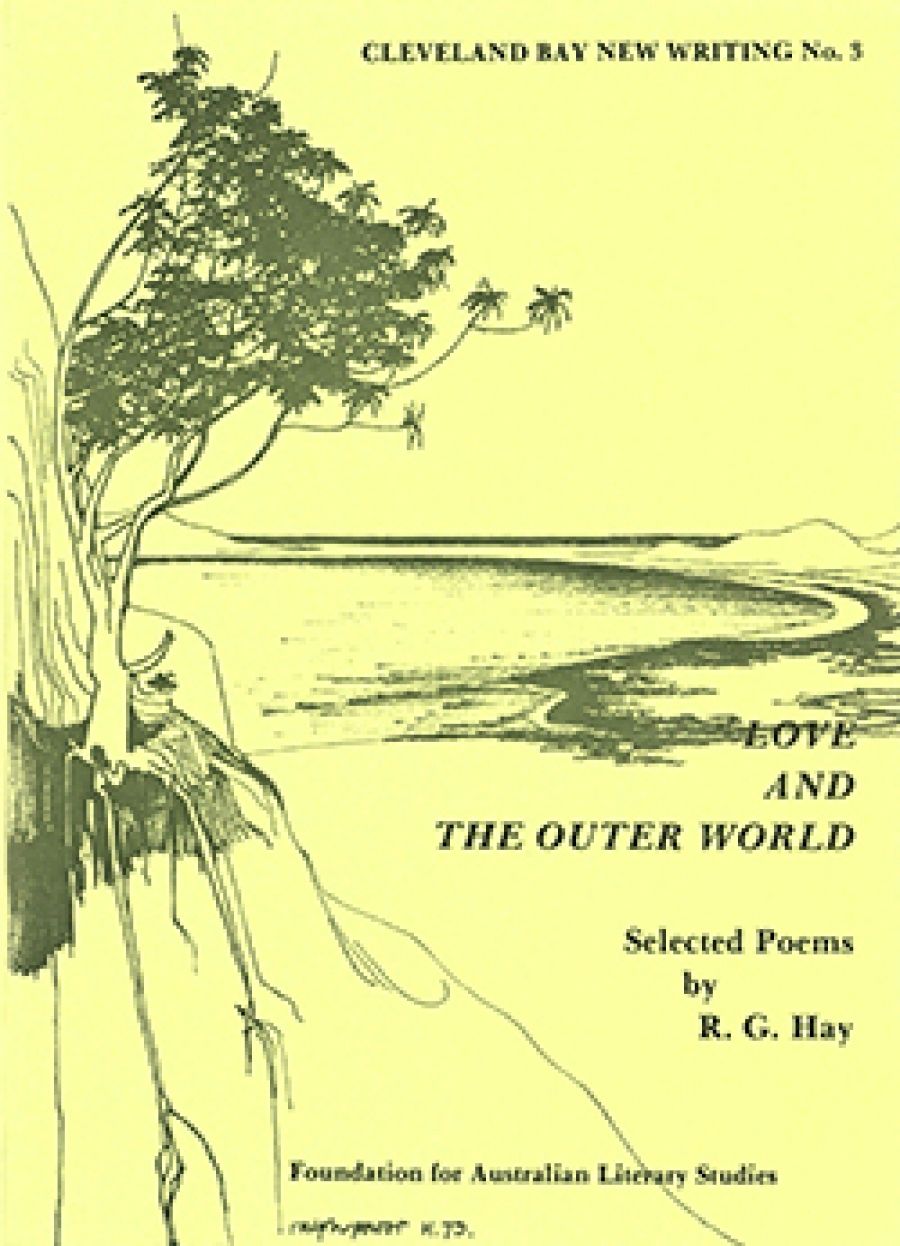
- Free Article: No
- Contents Category: Poetry
- Review Article: Yes
- Online Only: No
- Custom Highlight Text:
It was my good fortune to be born into a family for whom books and paintings had a central place. My parents subscribed to an excellent lending library and were adventurous readers of novels. During the Depression they could not often afford to buy a painting, but they went to art shows and Sunday visits to the Art Gallery of New South Wales were frequent in my childhood.
- Book 1 Title: Love and the Outer World
- Book 1 Subtitle: Selected poems
- Book 1 Biblio: James Cook University, $4.50 pb, 72 pp
My parents, who had travelled much in their youth, were very sniffy about old-fashioned people – some were still alive in those days – who had failed to recognise the worth of the Impressionists and ‘just look at the awful old Victorian rubbish they prefer!’ Yet they were pretty sniffy also about the Cubists and Surrealists and scornful of abstraction in art. A Picasso print would move them to merry fits.
My mother was the one who read poetry but ‘modern’ poetry for her ended with W.B. Yeats (middle period) and his contemporaries. Once her New Zealand cousin, Charles Brasch, sent some of his early poetry. ‘Who would understand such obscure verse?’ scoffed my mother and grandmother (her taste stopped short at Tennyson).
As to Charles’s poems I found it obscure to imagine what they found obscure. We could seldom agree to disagree and were a family given to pretty passionate arguments.
By the mid-1940s when I first published poetry in the Bulletin plenty of older readers complained that the ‘moderns’ like, say, Robert D. FitzGerald, Douglas Stewart, Roland Robinson, Judith Wright, Rosemary Dobson had no music and uttered no sense.
So, quite early in my career, I made one of the few resolutions I’ve managed to keep: that if I lived beyond a point when I could admire, enjoy or relate to what talented newcomers were creating, I’d at least shut up. I have no problems or constraints in reading the most recent novels from all over the world but as it happens, I have lived past real enjoyment from much recent poetry by younger writers, so I have shut up. I bowed out of reviewing poetry about ten years ago.
This is not to say that I cannot admire a good deal of contemporary poetry and I still read a lot of it, but merely that it seldom grabs my heart. Now I bow in again, once at least, for R.G. Hay’s Love and the Outer World. As to age Hay, born in 1933, has published poetry widely since the later 1960s and is scarcely a newcomer – he might I suppose be considered to stand somewhere between the older and younger poets who are writing today, but since Hay can’t be grouped with poets who were at the forefront in the 1940s and 1950s, I’d regard him as being in many ways closer to the younger writers which is where his wife Anne Lloyd, also a poet, belongs.
Bob Hay’s book does grab my heart. And so it should, for it celebrates love, and love poetry of any order is a rarity in this country.
An Epiphany in a Picture Theatre
Mousey, as you have said, an indifferent sort of light-brown,
undistinguished, as you claim:
but, caught in the beam from the projector,
your hair shone with the sheen of platinum:
so does your else ordinary self catch a glamour
from the illusion illuminating my mind.
The woman is his wife Anne to whom the book is dedicated.
Hay’s poetic voice is conversational and in the tradition that links our tradition of narrative and recitative verse to Mudie Dawes, Hart Smith and others. His joy in love is celebratory – physical not cerebral or satirical or symbolic of something else.
The first half of the book is called ‘The Outer World’ which has ‘ordinary routines of the unreal/world I inhabit in her absences’. The second half is called ‘Love’ but distinctions are not always clear cut. Of the ‘Outer World’ is:
After a Film About the Palm Island Strike
It would seem natural
to manacle the troublesome, shift them
elsewhere: that was the custom
brought Phillip in the first place,
spread them – Norfolk Island, Hobart Town,
Coal River, Redcliffe.
Chain and ship them, tradition
of Botany Bay culture: of course
the Aborigines wouldn’t understand.
If they had, that first fleet
would never have got ashore.
From ‘Love’ comes:
Effervescent
You were scared in a car on a steep wide road,
terrified in a twin-engined plane on a clear day
at five hundred feet with a sandy beach below,
so I expected you’d find the fragile plastic bubble
of the helicopter hard to enter: I certainly did.
Instead you were like a kid buying a ticket
for the ferris wheel: perhaps you think bubbles
the proper objects to go floating about in air.
Elizabeth Perkins contributes a foreword and I can’t better her comment that ‘This is a collection of immediately attractive poetry, disarmingly amiable at first encounter. Its relaxed tone suggests that we will meet no difficulties or unpleasant challenges, yet its calm statements engage our attention’. Or, as I’d repeat, it grabs my heart.


Comments powered by CComment